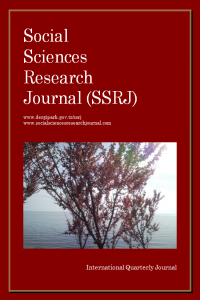Ev Sahibi Ekonomilere gelen Doğrudan Yabancı Yatırımlar ve Ortalama Ücret Düzeyleri Arasındaki İlişki: Panel VAR Analizi
DYY, Ortalama ücretler, OECD, Geçiş ekonomileri, Panel VAR
The Linkage between Inward FDI and Average Wage Levels in the Host Economies: A Panel VAR Analysis
FDI, Average wage levels, OECD, Transition economies, Panel VAR,
___
- Banga, R. (2005). Liberalisation and wage inequality in India, Working paper, No. 156, Indian Council for Research on International Economic Relations (ICRIER), New Delhi.
- Barry, F., Görg, H., & Strobl, E. (2005). Foreign direct investment and wages in domestic firms in Ireland: Productivity spillovers versus labour‐market crowding out. International Journal of the Economics of Business, 12(1), 67-84.
- Bhandari, B. (2007). Effect of inward foreign direct investment on income inequality in transition countries. Journal of Economic Integration, 888-928.
- Bruno, G. S., Crinò, R., & Falzoni, A. M. (2004). Foreign direct investment, wage inequality and skilled labour demand in EU accession countries. Centro Studi Luca d'Agliano Development Studies Working Paper, (188).
- Driffield, N., & Taylor, K. (2000). FDI and the labour market: a review of the evidence and policy implications. Oxford Review of Economic Policy, 16(3), 90-103.
- Driffield, N., & Taylor, K. (2006). Wage spillovers, inter-regional effects and the impact of inward investment. Spatial Economic Analysis, 1(2), 187-205.
- Driffield, N., & Girma, S. (2003). Regional foreign direct investment and wage spillovers: Plant level evidence from the UK electronics industry. Oxford Bulletin of Economics and Statistics, 65(4), 453-474.
- Feenstra, R. C., & Hanson, G. H. (1997). Foreign direct investment and relative wages: Evidence from Mexico's maquiladoras. Journal of international economics, 42(3-4), 371-393.
- Figini, P., & Görg, H. (2011). Does foreign direct investment affect wage inequality? An empirical investigation. The World Economy, 34(9), 1455-1475.
- Ge, Y. (2006). The effect of foreign direct investment on the urban wage in China: an empirical examination. Urban Studies, 43(9), 1439-1450.
- Girma, S., & Görg, H. (2007). Evaluating the foreign ownership wage premium using a difference-in-differences matching approach. Journal of International Economics, 72(1), 97-112.
- Glass, A. J., & Saggi, K. (1999). FDI policies under shared factor markets. Journal of International Economics, 49(2), 309-332.
- Gopinath, M., & Chen, W. (2003). Foreign direct investment and wages: a cross-country analysis. Journal of International Trade & Economic Development, 12(3), 285-309.
- Harrison, A., & Hanson, G. (1999). Who gains from trade reform? Some remaining puzzles. Journal of development Economics, 59(1), 125-154.
- Hayami, H., Nakamura, M., & Nakamura, A. (2012). Wages, overseas investment and ownership: Implications for internal labor markets in Japan. The International Journal of Human Resource Management, 23(14), 2959-2974.
- IMF. (2000). Transition Economies: An IMF Perspective on Progress and Prospects. Retrieved on November 1, .2020 from https://www.imf.org/external/np/exr/ib/2000/110300.htm
- Krishna, P., Poole, J. P., & Senses, M. Z. (2014). Wage effects of trade reform with endogenous worker mobility. Journal of International Economics, 93(2), 239-252.
- Lipsey, R. E., & Sjöholm, F. (2004). FDI and wage spillovers in Indonesian manufacturing. Review of World Economics, 140(2), 321-332.
- Maddala, G. S., & Wu, S. (1999). A comparative study of unit root tests with panel data and a new simple test. Oxford Bulletin of Economics and statistics, 61(S1), 631-652.
- Nguyen, D. T. H. (2019). Inward foreign direct investment and local wages: The case of Vietnam’s wholesale and retail industry. Journal of Asian Economics, 65, 101134.
- Nguyen, D. T. H., Sun, S., & Beg, A. R. A. (2019). How does FDI affect domestic firms’ wages? theory and evidence from Vietnam. Applied Economics, 51(49), 5311-5327.
- Pesaran, M. H. (2007). A simple panel unit root test in the presence of cross‐section dependence. Journal of applied econometrics, 22(2), 265-312.
- Taylor, K., & Driffield, N. (2005). Wage inequality and the role of multinationals: Evidence from UK panel data. Labour Economics, 12(2), 223-249.
- Tomohara, A., & Yokota, K. (2011). Foreign direct investment and wage inequality: is skill upgrading the culprit?. Applied Economics Letters, 18(8), 773-781.
- UNCTAD. (2020a). UNCTADSTAT. Retrieved on October 1, 2020 from https://unctadstat.unctad.org/wds/TableViewer/summary.aspx?ReportId=96740
- UNCTAD. (2020b). UNCTADSTAT. Retrieved on October 1, 2020 from https://unctadstat.unctad.org/wds/ReportFolders/reportFolders.aspx
- UNECE. (2020). UNECE Statistical Database. Retrieved on October 1, 2020 from https://w3.unece.org/PXWeb2015/pxweb/en/STAT/STAT__20-ME__3-MELF/60_en_MECCWagesY_r.px/
- Yayın Aralığı: Yılda 4 Sayı
- Yayıncı: Denta Florya ADSM Limited Company
Küresel Pandemi (COVID-19) ve Kent Yönetimlerinin Tepkisi: Londra Belediyesi Örneği
Öğrencilerin Okuduğunu Doğru Anlayamama Nedenlerine İlişkin Eğitimcilerin Görüşleri
Endüstri 4.0’ın Ergonomiye Getirdiği Değişimler
Turistik Beklentilerin İtme ve Çekme Stratejileri Bakımından Değerlendirilmesi
Batı Resim Sanatında Doğu Etkileri: Mary Cassatt’ın Eserlerindeki Japonizm Etkisi
Sinema Mitoloji İlişkisi Bağlamında Arketipsel Motiflerin Kullanımı: Pan’ın Labirenti Filmi Örneği
